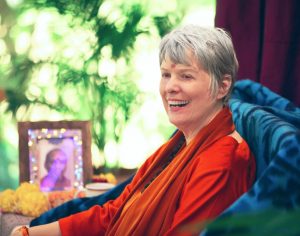 By Swami Nirmalananda Saraswati
By Swami Nirmalananda Saraswati
Svaroopa® yoga specializes in the deep inner absorption, yoga’s promise. This inner experience, whether it happens in Shavasana or in meditation, is deeper than sleep and at the same time more open and spacious. It is deep, yet it has a quality of lightness and it is easier to surface from. Coming out of this state, you feel profoundly rested – more rested than after a full night of sleep.
Since English has no word for this experience, you may think you fell asleep. Yet you know it was somehow different. Many people describe this inner absorption as being “better than sleep.” This is why yoga uses Sanskrit words, technical terminology that makes us able to talk about things that English does not name.
 Without words in English, you cannot name it, and you cannot even conceive that it is other than something you can name – sleep. The words you already know leave no room for you to acknowledge that something entirely different is happening. This is one of the reasons that I write these articles – to help you recognize that the things you are experiencing are beyond your concepts of what can happen. You need new vocabulary for this. You need words that describe the subtle and the profound. There are Sanskrit words for all the different types of inner experiences you have.
Without words in English, you cannot name it, and you cannot even conceive that it is other than something you can name – sleep. The words you already know leave no room for you to acknowledge that something entirely different is happening. This is one of the reasons that I write these articles – to help you recognize that the things you are experiencing are beyond your concepts of what can happen. You need new vocabulary for this. You need words that describe the subtle and the profound. There are Sanskrit words for all the different types of inner experiences you have.
In Shavasana, your deeper inner experience is either yoga nidra or tandra. It is a profound inner immersion into consciousness, which is your own essence. I like to call it, “going unconscious in consciousness.” It is like a scuba diver who has gone so deep that there is no light filtering down to that level, but the diver is there nonetheless. Next time, that diver might plan to bring an underwater light along. As you become more accustomed to this inner depth, you become more able to see and know where you are, which is a profound inner level of your own being.
 Yoga nidra feels more like floating. It is an inner immersion, but not as deep. You can hear the things going on around you, but they seem very far away and you are not much interested. You may have experienced this briefly while falling asleep at night. In fact, nidra means sleep, so this is a state of “yogic sleep,” which is restful without being heavy. The ancient tradition of yoga describes that the masters give their body 3 hours of rest each night by resting in yoga nidra. This way, they do not go unconscious nor do they tighten up. In sleep, your body tightens – you especially recognize this when you do poses in the morning. In yoga nidra, your body doesn’t tighten up. Most importantly, the rest that your body needs is easily available and very time efficient.
Yoga nidra feels more like floating. It is an inner immersion, but not as deep. You can hear the things going on around you, but they seem very far away and you are not much interested. You may have experienced this briefly while falling asleep at night. In fact, nidra means sleep, so this is a state of “yogic sleep,” which is restful without being heavy. The ancient tradition of yoga describes that the masters give their body 3 hours of rest each night by resting in yoga nidra. This way, they do not go unconscious nor do they tighten up. In sleep, your body tightens – you especially recognize this when you do poses in the morning. In yoga nidra, your body doesn’t tighten up. Most importantly, the rest that your body needs is easily available and very time efficient.
While these are deep and profound experiences, there is more…